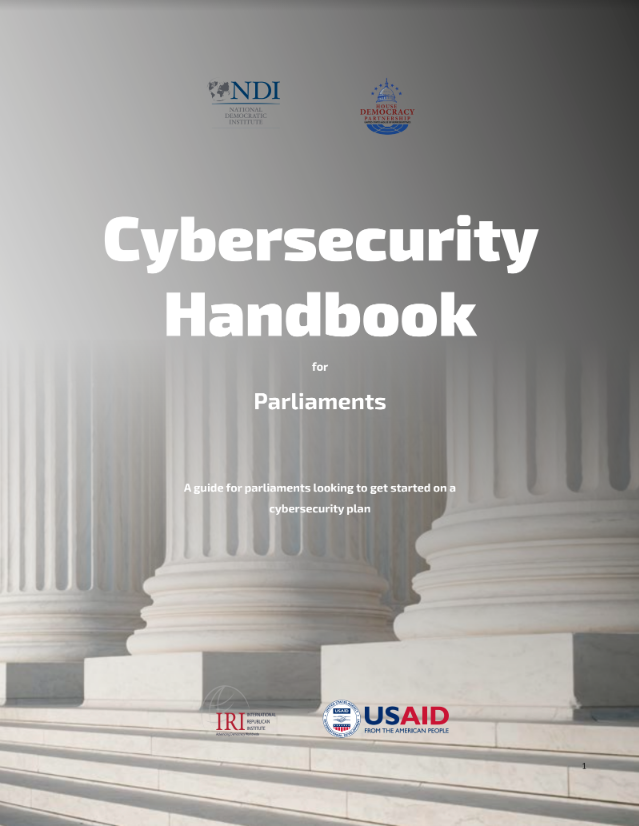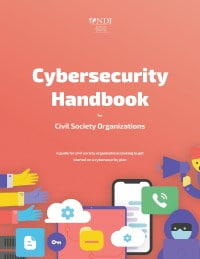Use the keyword search and filters to find recommended guides that fit your needs. You can also use the advanced search for more filtering options.
Technology Guides

FOSStering Democracy: Threats and Successes in Counter-Authoritarian Software Development
An NDI-published white paper examining how Free and Open Source (FOSS) public interest technology is essential to combatting digital authoritarianism and supporting democracy. The white paper draws on NDI’s programmatic expertise, as well as research and interviews with key leaders in the Internet Freedom space. It elaborates on the crisis faced in keeping democracy advocates safe online, outlines the challenges of the internet freedom technology “life cycle,” and identifies lessons learned about coordination, long-term financial sustainability, and technical support to inform the democracy community. The paper concludes with a road map towards building a sustainable public interest internet freedom technology infrastructure, including recommendations for governments, donors, implementers, and technologists.

5G and the Future Internet: Implications for Developing Democracies and Human Rights
5G adoption is happening around the world, even in places with low internet penetration. As of February 2021, 131 countries had announced plans to invest in 5G and more than 60 of the 98 countries NDI works in were engaging corporations that have close ties to the Chinese Communist Party (CCP) in their 5G plans. Existing research on 5G has focused almost exclusively on its impacts for international security and economic growth. Little is understood in the democracy donor community about the paths to 5G for developing democracies, how players in the 5G rollout process interact with democratic actors in a given country, or where there are strategic points of intervention to defend democracies from illiberal influences and technology standards. NDI set out to address this gap of comprehensive research into the impacts, positive or negative, of 5G on human rights and democracy through NDI's new white paper, 5G and the Future Internet: Implications for Developing Democracies and Human Rights.
Combatting Information Manipulation Playbook
A playbook for CSOs to identify, respond, and build resilience to info manipulation developed with IRI and the Stanford Internet Observatory. The playbook is intended to help leapfrog the first six months of the electoral preparation process and enable societies to effectively push back against efforts undermining free and fair elections, supporting democratic processes and rights more broadly.

Data Analytics for Social Media Monitoring
This guide is designed to help democracy practitioners better understand social media trends, content, data, and networks. By sharing lessons learned and best practices from across our global network, the guide empowers monitors to make democracy work online by helping them:
• Collaborate with local, national, or international partners;
• Understand different methods of data collection;
• Make the best use of mapping and data visualization;
• Analyze the online ecosystem;
• Detect malicious or manipulated content and its source;
• Understand available tools for all aspects of social media monitoring; and
• Know how to respond with data, methods, research, and more through social media.

Info/tegrity
Within NDI’s Democracy and Technology team (DemTech), the Info/tegrity initiative provides a framework to lead and support institutional initiatives countering disinformation and other forms of online manipulation, while strengthening the integrity of the information space. Through Info/tegrity, NDI has developed regional networks among civic technology and civil society organizations in Asia, Africa, Eurasia, and Latin America to exchange information, tools, and best practices.

Democratic Principles for the Information Space
The National Democratic Institute, in collaboration with members of the Design 4 Democracy Steering Committee, has developed this Statement of Principles in their shared commitment that technology platforms and products help build a more just and democratic world, and to bring together the concerns of the democracy community for action to these platforms.

Cybersecurity Handbook for Parliaments
The Handbook is an open-source resource designed to help parliaments develop an understandable and implementable cybersecurity plan. It includes explanations of key security topics that parliaments and their staff should be aware of, essential strategies and recommended tools to limit risk, and tips and links to additional resources that can help a parliament implement such recommendations. The Handbook was produced by NDI and the House Democracy Partnership (HDP)

Cybersecurity Handbook for Civil Society Organizations
The Handbook is an open-source resource designed to help civil society organizations develop an understandable and implementable cybersecurity plan. It includes explanations of key security topics that organizations and their staff should be aware of, essential strategies and recommended tools to limit risk, and tips and links to additional resources that can help an organization implement such recommendations. The Handbook material is also available as an online course.

Practical Cybersecurity for Organizations Online Course
NDI's Practical Cybersecurity for Organizations Online Course provides civil society organizations, political parties, and parliaments a unique online course opportunity to develop an understandable and implementable cybersecurity plan. The course, built off the material in NDI's Cybersecurity Handbooks, includes explanations of key security topics that these organizations their staff should be aware of, essential strategies and recommended tools to limit risk, and tips and links to additional resources that can help these groups implement such recommendations. Certificates are available for successful completion of the course and development of a cybersecurity plan.

Cybersecurity Handbook for Political Parties
The Handbook is an open-source resource designed to help political parties develop an understandable and implementable cybersecurity plan. It includes explanations of key security topics that parties and their staff should be aware of, essential strategies and recommended tools to limit risk, and tips and links to additional resources that can help a party implement such recommendations. The Handbook material is also available as an online course.
